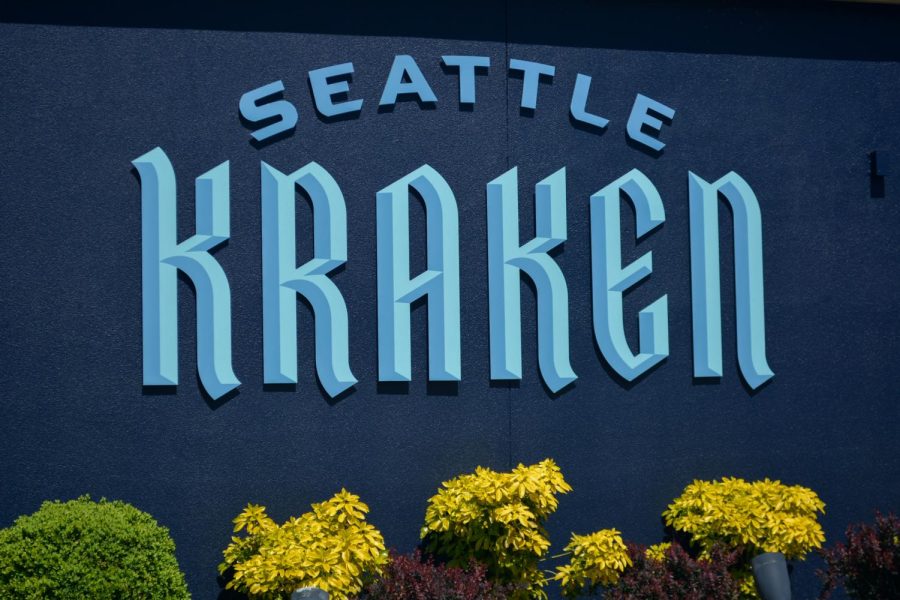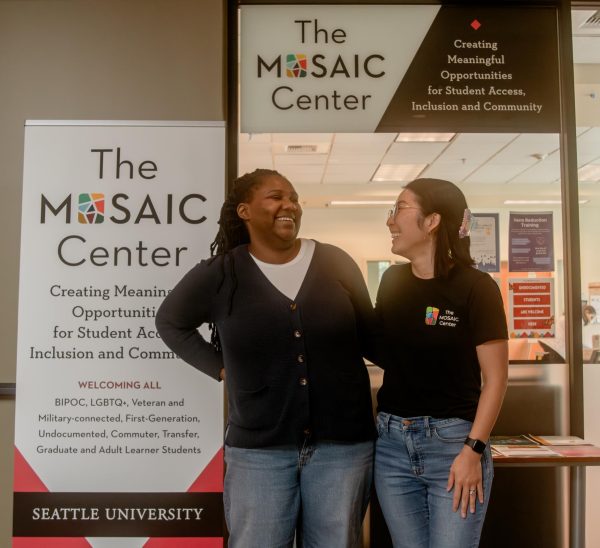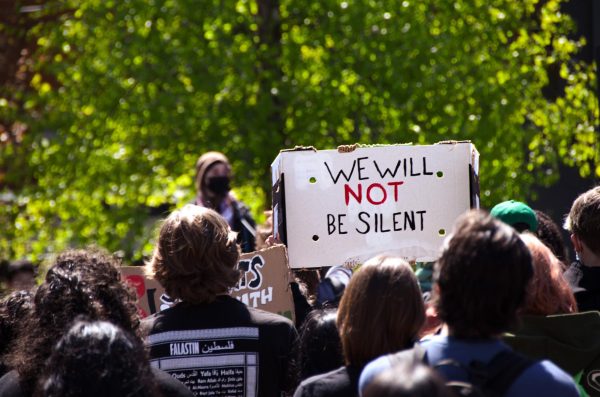Seattle Releases the Kraken
A freshly painted mural outside of the Kraken team store.
In Dec. 2018, the National Hockey League (NHL) approved a proposal by Seattle Hockey Partners to grant an expansion franchise to the city of Seattle. It wasn’t until close to two years later in Jul. 2020 that the team had a name. The Kraken.
The Kraken played their first regular season game Oct. 12, versus the NHL’s other most recent expansion team, The Vegas Golden Knights, which resulted in a 3-4 loss for The Kraken. They secured their first win in franchise history Oct. 14 when the team travelled to face the Nashville Predators. The Kraken defeated the Predators 4-3 in an impressive offensive performance.
Seattle University Sophomore and Environmental Studies major Luke Najarian has been getting into hockey in the past couple of years and is excited that Seattle now has its own franchise.
“I’m super pumped about it. It’s great when a new sports team starts in a city, since it doesn’t happen too often,” Najarian said.
Najarian and some of his fellow Seattle U students would have been interested in going to a game, yet they had to reconsider after seeing the cost of tickets.
The first day season tickets were released for Kraken home games, 33,000 people put down deposits for the chance to buy them. Meanwhile, close to 60,000 people now sit on a waiting list.
Najarian is particularly interested in attending a Kraken game due to what he describes as the “electric” nature of live hockey.
“Compared to other sports like football where there is an outdoor stadium, hockey being indoors has everyone right on top of each other, adding to the atmosphere of the game,” Najarian said.
Sophomore Brooke Kierzek, an environmental engineering major at Seattle U, knows all about the fast-paced action of hockey.
“I’ve played hockey since first grade… I’m from Minnesota so it was kind of the thing to do,” Kierzek said.
Kierzek attended her first Minnesota Wild game during her senior year of high school. The Wild are one of three teams the Kraken have beaten so far this year. Brooke is also interested in attending a Kraken game.
“I was actually talking to my father about this because he had called me when they beat the Wild. I think out of all professional sports in Seattle, the Kraken would definitely be my first choice,” Kierzek said.
She is excited about the Kraken’s potential to bring Seattleites together in support of the city’s newest team.
“I hope they grow as a team, not just for their own success but for the city as a whole,” Kierzek said.
With an already bombastic fan base throughout the city, Kierzek hopes that the team will do what it takes to keep the city’s support.
Alec Yusov, a third-year business economics student, became interested in the NHL while studying at the University of Rochester and watching their AHL team, the Rochester Americans, before transferring to Seattle U.
“We had pretty great hockey available right nearby, and I really fell in love with the sport while watching it in person in Rochester. You really get to appreciate the speed of the game and the violence of the impacts on boards—there’s nothing like it in sports,” Yusov said.
Yusov’s move back to his hometown of Seattle and increased interest in hockey came at the perfect time.
“I love supporting Seattle sports, so when that first trailer came out, I literally shed a tear. I was so excited for Seattle to have their own team,” Yusov said.
Yusov plans on attending a game later in the season when tickets are less expensive, but is already impressed by the way the arena’s design lends itself to an energized crowd.
“I love how the sides of the stadium are vertical, it looks like the ice is so deep in the ground, it’s such a cool atmosphere. It allows them to pack people close to the ice and get that classic Seattle crowd noise going,” Yusov said.
Yusov encourages Seattlities who are not acquainted with the sport to give it a chance now that the city has an NHL franchise.
“It’s a really great time to get into hockey. Just turn the TV on and have it on in the background. The Kraken are actually competitive… we’re going to battle every single night.”
Grant Balcer, a sophomore marketing major, has already attended a Kraken home game. He described the experience of going to Climate Pledge for their first home win versus the Montreal Canadiens as “awesome.”
“The arena sits lower in the ground then normal so when you walk in you actually look down to get a glimpse of the ice,” Balcer said.
Balcer went on to describe how this made all the seating feel very close to the action. Even though he himself was seated in the “nosebleeds,” Balcer was still close enough to read the names on the backs of the players.
With the final score of the game being 5-1, the Kraken quelled Balcer’s doubts that the team might have issues with offensive productivity.
“When I watched the expansion draft, it was shocking because the players they could have got versus the players they did get were a surprise… The good thing is that they have shown that they can score goals through their first few games,” Balcer said.
As it is the Kraken’s inaugural season, Balcer does not see an obvious conclusion for the team’s success or failure this year.
“At the end of the year, I wouldn’t be surprised if they make the playoffs, but I also wouldn’t be surprised if they finished last in the league,” Balcer said. For being a new team, “chemistry is the biggest thing.”
While many loyal Seattle based Kraken fans intently watched these games on television, it was not until Oct. 23 that they were able to see their team play at home right next to the Puget Sound, where a mythic sea monster might rightfully belong.
Fan support could not have been more tangible throughout the city. The Kraken’s inaugural home game was sold out. Taking place at Climate Pledge Arena, it has been close to 100 years since Seattleites have had a professional hockey team to root for. The Stanley Cup winning Seattle Metropolitans folded in 1924 when they couldn’t find a suitable arena in which to play.
The Kraken players skated onto the ice at Climate Pledge Arena for the very first time the morning of their inaugural game versus the Vancouver Canucks. It is no surprise they might have some growing pains in the coming season. Losing that inaugural home game 4-2, the Kraken are, as expected, still trying to find their groove in the ice, so far starting their season 3-6-1.
The season’s slow start has not hindered the support of fans in the Seattle U community. In addition to garnering attention from Seattle U hockey fans, the Kraken has made its mark on the Albers School of Business and Economics.
Rose Kaser, the graduate program coordinator for the new MBA in Sport and Entertainment Management, explained the strong ties between the emergence of the Kraken in Seattle and the university’s newly offered master’s degree.
“We moved to the business school, where we needed an advisory board—reaching out to industry professionals is how you do that. So this program is a result of that collaboration. It was their input which transformed and shaped the program as it is,” Kaser said.
In recent years, the NHL has taken steps to make the league and its corporate atmosphere more diverse and inclusive. Albers’ lecturer Kellie Rodriguez Currie specializes in sport law and underscored the NHL’s efforts on the renewed focus on equity and inclusion within Albers’ sport programs.
“Initially we looked to them [the NHL] for, ‘what do we need to be teaching our students to get careers in the sports industry from a knowledge standpoint,’” Currie said.
As the advisory board process progressed, it became clear that the team also had social justice initiatives from which Albers faculty could learn and integrate into the curriculum of the Sport and Entertainment masters.
“The NHL … has been pivotal among professional leagues in being inclusive and wanting to change the narrative as they are historically a very white league, and being proactive in changing some of those narratives,” Currie said. “So on the advisory board and in the program as well, we are very intentional on making diversity equity and inclusion pillars of the program.”
The Kraken has also done the difficult work of erecting a large stadium in a dense and expensive city. Kaser is impressed by the building.
“Clearly they have done a fantastic job, the building is beautiful and the efforts behind it are amazing. It is located in a very sports and fan-oriented city,” Kaiser said. “They have gone through all the expense, as it was not a cheap project, and now clearly the community has responded very well to them.”
The Climate Pledge Arena touts itself as “the most progressive, responsible and sustainable arena in the world,” due to technologies such as its rain-to-rink system which filters water from the facility roof to the ice below to conserve water usage. Currie highlighted the value of these accomplishments for Seattle as a city.
“They did a couple of things really well, it’s sustainable, setting a standard in a landscape where we are looking at a climate crisis of a huge magnitude. Also compared to other cities who are losing money hand over fist in some cases, spending on arenas and infrastructure … Seattle got a really good deal here at a time when cities are not getting good deals,” Currie said.
The $1.5 billion renovation of Climate Pledge was privately funded, an increasingly rare phenomenon for sports leagues, who often lobby for public funds to build or renovate arenas.
Currie is also excited to support the team as a fan outside of her professional life
“I think people are ecstatic. I have had my Kraken gear for almost two years now,” Currie said.
After billions of dollars and a great deal of work behind the scenes, the people of Seattle can now look forward to an NHL season where they can root for their home team. In a city known mostly for its tech sector and rainy weather, the Kraken are bringing a newfound vibrance to the Emerald City, which fans hope will last well into the future.











